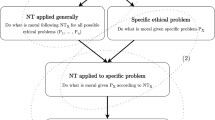Abstract
Most of the existing work in the study of bargaining behavior uses techniques from game theory. Game theoretic models for bargaining assume that players are perfectly rational and that this rationality is common knowledge. However, the perfect rationality assumption does not hold for real-life bargaining scenarios with humans as players, since results from experimental economics show that humans find their way to the best strategy through trial and error, and not typically by means of rational deliberation. Such players are said to be boundedly rational. In playing a game against an opponent with bounded rationality, the most effective strategy of a player is not the equilibrium strategy but the one that is the best reply to the opponent’s strategy. The evolutionary model provides a means for studying the bargaining behaviour of boundedly rational players. This paper provides a comprehensive comparison of the game theoretic and evolutionary approaches to bargaining by examining their assumptions, goals, and limitations. We then study the implications of these differences from the perspective of the software agent developer.
Similar content being viewed by others
References
J. Andreoni J. H. Miller (1995) ArticleTitleAuctions with Artificial Adaptive Agents Games and Economic Behavior 10 39–64 Occurrence Handle0832.90019
Anthony, P. Jennings, N. R. (2002). Evolving Bidding Strategies for Multiple Auctions. In Proceedings of the 15th European Conferenceon Artificial Intelligence (ECAI-2002) 178–182.
K. Binmore M. Piccione L. Samuelson (1998) ArticleTitleEvolutionary Stability in Alternating-Offers bargaining Games Journal of Economic Theory 80 257–291 Occurrence Handle0911.90365 Occurrence Handle1637472
J. Bullard J. Duffy (1998) ArticleTitleA Model of Learning and Emulation with Artificial Adaptive Agents Journal of Economic Dynamics and Control 22 179–207 Occurrence Handle1488360
H. Dawid (1996) Adaptive Learning by Genetic Algorithms: Springer Berlin Heidelberg, New York Occurrence Handle0870.90051
Ellingsen, T. (1997). The Evolution of Bargaining Behavior. The Quarterly Journal of Economics 581–602.
P. Faratin C. Sierra N. R. Jennings (1998) ArticleTitleNegotiation Decision Functions for Autonomous Agents International Journal of Robotics and Autonomous Systems 24 IssueID3-4 159–182
Fatima, S. S., Wooldridge, M. & Jennings, N. R. (2001). Optimal Negotiation Strategies for Agents with Incomplete Information. In Meyer J. J. & Tambe, M. (eds.) Intelligent Agent VIIISpringer Lecture Notes in AI, 377--392.
S. S. Fatima M. Wooldridge N. R. Jennings (2002a) The Influence of Information on Negotiation Equilibrium J. Padget O. Shehory D. Parkes N. Sadeh W. E. Walsh (Eds) Agent Mediated Electronic Commerce IV - Designing Mechanisms and Systems Springer Berlin 180–193
S. S. Fatima M. Wooldridge N. R. Jennings (2002b) Multi-Issue Negotiation Under Time Constraints C. Castelfranchi W. L. Johnson (Eds) International Conference on AutonomousAgents and Multi-Agent Systems Bologna Italy 143–150
Fatima, S. S., Wooldridge, M. & Jennings, N. R. (2003). Comparing Equilibria for Game Theoretic and Evolutionary Bargaining Models. In proceedings of the Fifth International Workshop on Agent Mediated Electronic Commerce (AMEC-03). Melbourne, Australia, 70--77.
S. S. Fatima M. Wooldridge N. R. Jennings (2004) ArticleTitleAn Agenda Based Framework for Multi-Issue Negotiation Artificial Intelligence Journal 152 IssueID1 1–45 Occurrence Handle1082.91510 Occurrence Handle2027529
R. Fisher W. Ury (1981) Getting to Yes: Negotiating Agreement Without Giving in Houghton Mifflin Boston
D. Fudenberg D. Levine J. Tirole (1985) Infinite Horizon Models of Bargaining with One Sided Incomplete Information A. Roth (Eds) Game Theoretic Models of Bargaining University of Cambridge Press Cambridge
D. Fudenberg J. Tirole (1983) ArticleTitleSequential Bargaining with Incomplete Information Review of Economic Studies 50 221–247 Occurrence Handle0508.90094 Occurrence Handle702163
D. E. Goldberg (1989) Genetic Algorithms Addison-Wesley Newyork Occurrence Handle0721.68056
J. Harsanyi R. Selten (1972) ArticleTitleA Generalized Nash Solution for Two-Person Bargaining Games with Incomplete Information Management Science 18 IssueID5 80–106 Occurrence Handle10.1287/mnsc.18.5.80 Occurrence Handle295773
J. C. Harsanyi (1956) ArticleTitleApproaches to the Bargaining Problem before and After the Theory of Games Econometrica 24 144–157 Occurrence Handle0071.14008 Occurrence Handle81215
M. Heinemann (2000) ArticleTitleAdaptive Learning of Rational Expectations Using Neural Networks Journal of Economic Dynamics and Control 24 1007–1026 Occurrence Handle0951.62093
N. R. Jennings P. Faratin A. R. Lomuscio S. Parsons M. Wooldridge (2001) ArticleTitleAutomated Negotiation: Prospects Methods and challenges Group Decision and Negotiation 10 IssueID2 199–215 Occurrence Handle10.1023/A:1008746126376
Johnson, R. (1993). Negotiation BasicsSage: Newbury Park.
Koza, J. R., Bennett, F. H., Andre, D. & Keane, M. A. (1999). Genetic Programming III Darwinian Invention andProblem Solving. Morgan Kaufmann Publishers.
S. Kraus (2001) Strategic negotiation in multi-agentenvironments The MIT Press Cambridge, MA
A. Lomuscio M. Wooldridge N. R. Jennings (2003) ArticleTitleA Classification Scheme for Negotiation in Electronic Commerce International Journal of Group Decision and Negotiation 12 IssueID1 31–56
R. E. Lucas (1986) ArticleTitleAdaptive Behavior and Economic Theory Journal of Business 59 S401–S426
M. Ma (1999) ArticleTitleAgents in E-commerce Communications of the ACM 42 79–80
P. Maes R. Guttman A. Moukas (1999) ArticleTitleAgents that Buy and Sell Communications of the ACM 42 IssueID3 81–91
M. Mitchell (2001) An Introduction to Genetic Algorithms The MIT Press Cambridge, MA
J. F. Nash (1950) ArticleTitleThe Bargaining Problem Econometrica 18 155–162 Occurrence Handle35977
M. J Osborne A. Rubinstein (1990) Bargaining and Markets Academic Press San Diego California Occurrence Handle0790.90023
M. J. Osborne A. Rubinstein (1994) A Course in Game Theory Cambridge The MIT Press
D. G. Pruitt (1981) Negotiation Behavior Academic Press New York
H. Raiffa (1982) The Art and Science of Negotiation University Press Cambridge, USA Harvard
T. Reichmann (1999) ArticleTitleLearning and Behavioral Stability – An economic Interpretation of Genetic Algorithms Journal of Evolutionary Economics 9 225–242
J. S. Rosenschein G. Zlotkin (1984) Rules of Encounter MIT Press Cambridge
Roth, A. (1979). Axiomatic Models of Bargaining. Springer-Verlag Berlin.
A. E. Roth (1995) Bargaining Experiments J. Kagel A. E. Roth (Eds) Handbook of Experimental Economics Princeton University Press Princeton, NJ
A. Rubinstein (1982) ArticleTitlePerfect Equilibrium in a Bargaining Model Econometrica 50 IssueID1 97–109 Occurrence Handle0474.90092 Occurrence Handle640168
A. Rubinstein (1985) ArticleTitleA Bargaining Model with Incomplete Information About Time Preferences Econometrica 53 1151–1172 Occurrence Handle0588.90103 Occurrence Handle809908
L. Samuelson (1996) ArticleTitleBounded Rationality and Game Theory The Quarterly Review of Economics and Finance 36 17–35
Sandholm, T. & Vulkan, N. (1999). Bargaining with Deadlines. In Procceding of the AAAI-99 . Orlando, FL, 44--51.
T. Sandholm (2000) ArticleTitleAgents in Electronic Commerce: Component Technologies for Automated Negotiation and Coalition Formation Autonomous Agents and Multi-Agent Systems 3 IssueID1 73–96
Sandholm, T. & Vulkan, N. (1999). Bargaining with Deadlines. In Procceding of the AAAI-99. Orlando, FL, 44--51.
E. van Damme (1983) Refinements of the Nash equilibrium concept Springer-Verlag Berlin Occurrence Handle0523.90095
J. Neumann Particlevon O. Morgenstern (1944) Theory of Games and Economic Behavior Princeton University Press Princeton NJ Occurrence Handle0063.05930
Yao, X. & Darwen, P. (2000). Genetic Algorithms and Evolutionary Games. In Commerce, Complexity and Evolution. Cambridge University Press: Cambridge, 313--333.
H. P. Young (1993) ArticleTitleAn Evolutionary Model of Bargaining Journal of Economic Theory 59 145–168 Occurrence Handle0778.90096 Occurrence Handle1211554
Author information
Authors and Affiliations
Corresponding author
Rights and permissions
About this article
Cite this article
Fatima, S.S., Wooldridge, M. & Jennings, N.R. A Comparative Study of Game Theoretic and Evolutionary Models of Bargaining for Software Agents. Artif Intell Rev 23, 187–205 (2005). https://doi.org/10.1007/s10462-004-6391-1
Issue Date:
DOI: https://doi.org/10.1007/s10462-004-6391-1




